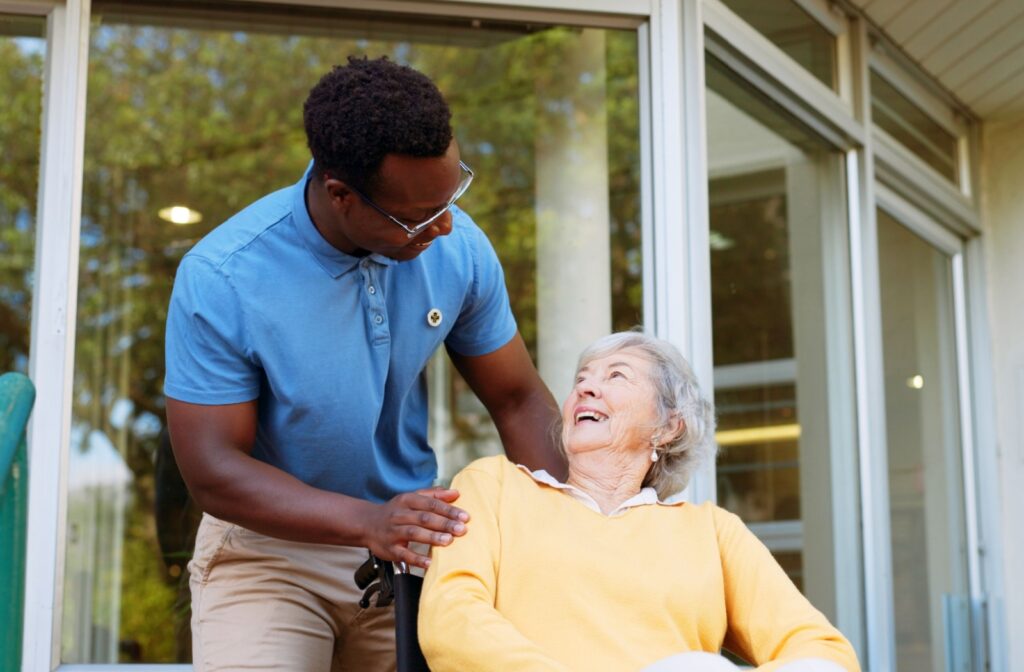Thinking about a career in assisted living? You’re considering meaningful work with real impact. Assisted living teams help residents live with dignity, comfort, and purpose. If you’re drawn to care, teamwork, and growth, this field offers clear pathways—from caregiving to nursing, dining, life enrichment, operations, sales, and leadership. Here’s what it takes to succeed and how to get started.
Core Skills That Make You Effective on Day One
Compassion and Empathy
Assisted living is people-first. You’ll support residents through daily routines, health changes, and moments of joy. Compassion helps you connect. Empathy helps you understand the “why” behind a behavior or request. Together, they build trust—a foundation for quality care and resident satisfaction.
How it shows up:
- Taking the time to listen before you act.
- Respecting preferences and independence.
- Meeting residents where they are—physically, emotionally, and cognitively.
Clear, Respectful Communication
You’ll coordinate with residents, families, nurses, caregivers, and partners. Strong communication keeps everyone aligned and safe.
What to practice:
- Speak plainly and kindly, avoiding jargon.
- Use active listening and confirm understanding.
- Keep accurate and timely records of your actions and care.
- Adapt your style for residents with hearing loss, memory changes, or anxiety.
Reliability and Professional Integrity
In senior living, consistency builds safety. Showing up on time, following care plans, and honoring commitments allows your team to deliver dependable support. Integrity also means reporting concerns, following policies, and protecting resident privacy.
Time Management and Organization
No two shifts are identical. You’ll juggle medications, meals, activities, family calls, and documentation. Prioritizing critical tasks, planning your route, and batching similar activities help you stay calm and efficient.
Practical tip: Use checklists for routine tasks and set reminders for med passes and care updates.
Teamwork and Collaboration
Care is a team sport. You’ll partner with caregivers, nurses, life enrichment, dining, housekeeping, and maintenance. Strong teams communicate early, share observations, and help each other without waiting to be asked.
Qualifications That Open Doors
Assisted living welcomes both experienced professionals and career changers. Many roles offer training and advancement. While requirements vary by state and community, here’s what commonly helps:
- High school diploma or GED: Required for most entry-level roles.
- Certified Nursing Assistant (CNA) or Home Health Aide (HHA): Often preferred for caregiver positions. Some communities provide paid training or support certification.
- Medication aide/technician certification: Needed if you’ll pass medications.
- CPR and First Aid: Frequently required and often offered on-site.
- Food safety certifications: Useful for dining and culinary roles.
- Activity professional training: A useful skillset for life enrichment positions.
- Valid driver’s license: Helpful for transportation roles.
- Leadership and sales experience: Valuable for department leads, sales, and operations.
If you’re new to senior living, don’t count yourself out. Many communities hire for heart and train for skill. A service mindset, strong work ethic, and willingness to learn go a long way.

Personal Attributes That Help You Thrive
Patience and Emotional Resilience
Residents and families may be navigating stress, grief, or change. Patience creates space for dignity. Resilience helps you reset after a hard moment and show up with care for the next one.
Respect for Independence and Choice
Assisted living supports autonomy. The goal is to do with, not for. Asking permission, offering options, and honoring routines help residents maintain control over their day.
Attention to Detail
From monitoring changes in condition to following diet textures, details matter. Accurate notes and handoffs can prevent falls, medication errors, and avoidable hospital visits.
Cultural Competence
Residents come from many backgrounds. Being curious, respectful, and flexible with traditions, language preferences, and family roles ensures inclusive, person-centered care.
Growth Mindset
Senior living evolves. New technologies, care practices, and regulations appear regularly. People who seek feedback, ask questions, and pursue credentials advance faster and deliver better care.
Career Paths Across Senior Living
Senior living offers more variety than many people realize, with clear progression for those who want to grow. Based on common community structures, you’ll find opportunities in:
- Care and clinical: Caregiver, med tech, CNA/HHA, LPN/LVN, RN, wellness nurse, care coordinator, memory care lead
- Life enrichment: Activity assistant, life enrichment coordinator, memory care program specialist
- Dining and hospitality: Server, cook, sous chef, dining room manager, hospitality lead
- Operations and leadership: Concierge, business office, maintenance, housekeeping, department head, executive director
- Sales and marketing: Sales counselor, move-in coordinator, director of sales
Many professionals start in entry-level roles and progress into leadership or clinical positions with mentorship and training. If you enjoy mentoring others, solving problems, and improving systems, operations, and departments, leadership can be a natural next step.
What Hiring Managers Love to See
- Resident-centered stories: Be ready to share examples of how you improved someone’s day or solved a sensitive challenge.
- Dependable work history: Attendance, flexibility, and reliability matter.
- Training and credentials: Even short courses (dementia care, de-escalation, food safety) signal initiative.
- Tech comfort: EHR systems, eMARs, scheduling apps, and communication tools are common. Willingness to learn is key.
- Service excellence: Hospitality experience translates well—especially for dining, concierge, and sales roles.
How to Build These Skills Starting Now
- Volunteer or shadow: A few hours in a community can confirm fit and build confidence.
- Take a short course: CPR/First Aid, dementia care basics, or medication aide training can set you apart.
- Practice communication: Role-play tough conversations, practice de-escalation, and learn to document clearly.
- Strengthen your routine: Build habits around punctuality, organization, and follow-through.
- Ask for feedback: Small, steady improvements compound into standout performance.
The Impact You Can Make
When you join assisted living, your work has visible results. A safe transfer prevents a fall. A favorite song sparks conversation. A timely note helps a nurse catch a change in condition early. These moments add up to better days for residents and peace of mind for families. If you value purpose and teamwork, you’ll find both here.
Ready to Explore Your Next Step?
If you’re looking for a welcoming, growth-focused place to build your career, take a closer look at our opportunities. With more than two decades of leadership in senior living and a range of paths across care, dining, life enrichment, sales, and operations, Distinctive Living supports team members at every stage. Explore current openings and see where your skills can shine.




